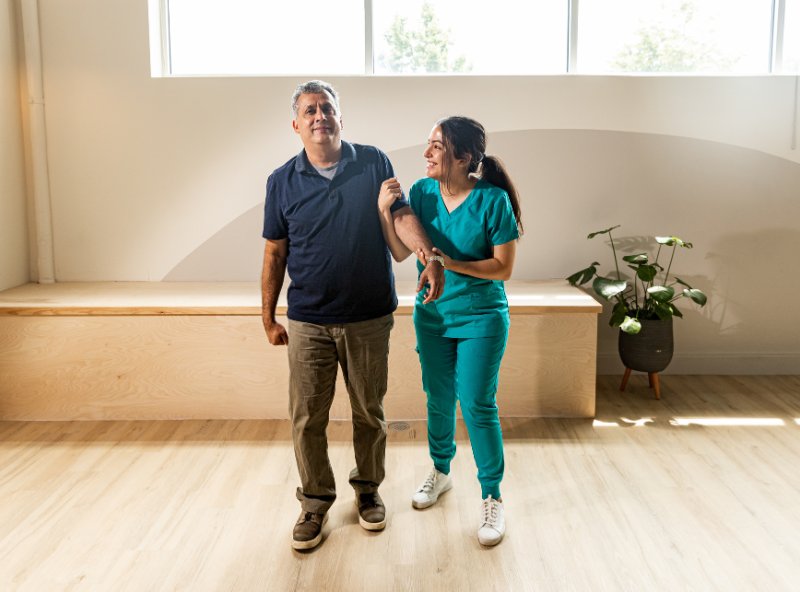Feeling dizzy, off-balance, or disoriented can make simple daily tasks hard. Vestibular rehabilitation is a proven therapy that helps people with balance disorders restore stability and reduce dizziness. In this post we explain what vestibular rehabilitation is, who it helps, what happens in treatment, and why Renew Clinics is your best partner in Surrey, South Surrey, and Langley.
What Is the Vestibular System?
The vestibular system lives in your inner ear. It gives your brain information about motion, head position, and spatial orientation. It works together with your vision, muscles, joints, and nerves to help you balance, walk without tripping, and stay steady while moving. If something disrupts this system—by injury, infection, or disease—you might experience vertigo, dizziness, imbalance, or nausea.
What Is Vestibular Rehabilitation?
Vestibular rehabilitation (sometimes called vestibular rehabilitation therapy, VRT) is a specialised form of physiotherapy. It uses exercises and interventions tailored to your condition to help your brain adapt, compensate, and manage the altered signals from the vestibular system. The goal is to reduce symptoms, improve balance and reduce the risk of falling.
Who Can Benefit?
Many people can benefit from vestibular rehabilitation, including those with:
- Benign Paroxysmal Positional Vertigo (BPPV)
- Vestibular neuritis or labyrinthitis
- Ménière’s disease
- Persistent dizziness or imbalance (after concussions, head injuries, or in older age)
- Balance issues due to neurological conditions (stroke, etc.)
What to Expect: Assessment & Treatment
Vestibular rehabilitation is not “one size fits all.” Here’s what the process usually looks like:
- Initial Evaluation
The therapist takes your medical history and performs tests that may include: balance and gait tests, eye‐movement and head movement tests, vestibular function tests, posture and strength assessments. This helps find out what parts of your vestibular system are malfunctioning. - Custom Treatment Plan
Based on assessment, a plan is made. It will include exercises such as:- Gaze stabilization (eye/head movement exercises)
- Balance training (standing, walking, unstable surfaces)
- Habituation exercises (gradually exposing you to movements or environments that trigger symptoms)
- Substitution/compensation strategies (using vision or proprioception more to offset vestibular deficits)
- Therapy Sessions & Home Exercises
You typically attend therapy sessions regularly (often 1-2 times per week) while also doing prescribed exercises at home. The home practice is crucial: the brain’s plasticity works better with consistent stimulus. - Progress Over Time
Improvements may start slowly. Over weeks, you often see less dizziness, better stability, improved ability to walk, move your head without fear of spinning, etc. For many, visible gains come after several weeks; full recovery depends on condition, age, how early treatment begins, and how well exercises are followed. - Maintenance
Once you reach a level of stability, you might still need periodic follow-ups or maintenance exercises to keep vestibular function good and avoid relapse.
Benefits of Vestibular Rehabilitation
Vestibular rehab offers many advantages:
- Reduced vertigo, dizziness, and nausea.
- Better balance and fewer falls.
- Improved confidence in walking, turning, moving your head.
- Enhanced vision stability when moving.
- Improved ability to perform daily tasks (climbing stairs, going for walks, etc.).
- Better overall quality of life and mental health (less anxiety or fear related to motion).
How Long Does It Take?
The timeline depends on:
- Severity of symptoms
- Underlying cause
- How soon therapy begins after onset
- How consistent you are with sessions and home practice
Often improvements appear in 4-8 weeks of consistent therapy; more complicated cases may take several months. Some people notice significant relief earlier, especially for simpler cases like BPPV when positional maneuvers are effective.
Are There Risks or Side Effects?
Vestibular rehabilitation is generally safe. But you may experience:
- Temporary increase in dizziness or imbalance after doing certain exercises
- Mild discomfort or fatigue
- Slower progress if you cannot follow home exercise or skip sessions
It’s important to inform your therapist if symptoms worsen, or if you develop new symptoms.
Tips to Help You Get the Best from Vestibular Rehabilitation
- Follow home exercise instructions carefully. Daily practice often makes a difference.
- Be patient. Progress may be gradual.
- Keep your therapist informed: what’s helping, what isn’t.
- Modify your environment: avoid slippery surfaces, use handrails, good lighting.
- Stay active as much as possible—movement itself supports recovery.
- Manage other factors: sleep, hydration, stress all affect how your body recovers.
Why Choose Renew Clinics in Surrey, South Surrey, and Langley
If you’re looking for vestibular rehabilitation, here are reasons why Renew Clinics is a strong choice in the area:
- Our team includes experienced physiotherapists trained specifically in vestibular rehabilitation.
- We assess each patient individually and prescribe custom plans (in-clinic + home exercises).
- Our facilities are well equipped for balance training, eye/head movement exercises, and safe practice.
- We’re conveniently located in Surrey, with clinics serving South Surrey and Langley, so you don’t have to travel far.
- We focus not just on reducing symptoms, but restoring the confidence to move freely and safely without fear.
Summary
Vestibular rehabilitation is a safe, evidence-based therapy to manage dizziness, vertigo, imbalance, and related symptoms. It works by retraining your brain and body to compensate for vestibular dysfunction, improving balance, and boosting quality of life. If you live in Surrey, South Surrey, or Langley, Renew Clinics offers top-quality vestibular rehabilitation to help you reclaim stability, confidence, and normal daily life.
About Renew Clinics
Renew Clinics is a leading service provider for vestibular rehabilitation in Surrey. We also serve South Surrey and Langley. If dizziness, vertigo or balance issues are affecting you, contact us today to book an assessment. Let us help you walk steadier, feel safer, and live better.

